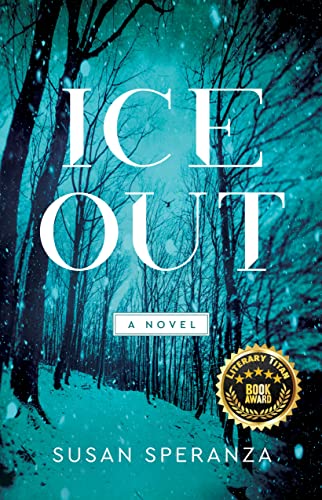 Synopsis:
Synopsis:
Ice Out is the story of a woman’s journey from grief to acceptance and forgiveness when her life is shattered by a tragic accident.
Francesca Bodin has a near-perfect life as an accomplished music teacher and professional flutist living in the country with her husband, Ben, and their four-year-old daughter, Addie. But it ends abruptly when a snowmobiling accident traps the three of them in a frozen lake. Ben escapes, leaving her and Addie behind to die.
Francesca believes she sees their dog pull Addie from the lake and drag her into the nearby woods. Desperate to help her daughter, she struggles to emerge from the icy waters and follows them.
But when she enters the forest, she becomes trapped in a sinister dream-like world where night never ends, Addie’s whereabouts remain a mystery, and she encounters a strange group of women who, like Francesca, have been left to die. Now they’re seeking revenge on those who harmed them. And they have Ben in their sights.
Francesca comes to understand that in order to escape this nightmare and save her daughter, she must first save the husband who abandoned both of them.
Review:

Author Susan Speranza grew up on Long Island, New York, and studied psychology and philosophy. That “didn’t translate into earning money or job security,” so she pursued a variety of ways to earn a living in New York City, eventually tiring of city life and moving to rural Vermont. These days, she works as a high school librarian, and breeds and trains Pekingese dogs when she isn’t writing. She says she has always been a writer, finding it “easier to express my thoughts and feelings in writing than speaking – maybe because I came from a big, loud Italian family where it was almost impossible to get a word in anywhere . . . So instead of speaking, I wrote.” She has published poems, short stories, essays, and two prior books: The City of Light, a dystopian fantasy about the end of western civilization, and a novel about a dysfunctional suburban family titled The Tale of Lucia Grandi, the Early Years. Ice Out has been nominated for numerous awards and won the 2022 Literary Titan Book Gold Award.
Speranza says the book was inspired by her experiences seeing “people’s lives turn on a dime. What was a perfect, happy, fulfilling life changed in an instant, and those people found themselves in circumstances they never dreamed of. They then acted in ways they never anticipated. I have always been interested in such events, how they change people, how people react.” That’s one of the things she wanted to explore in Ice Out, along with the themes of grief and forgiveness, in a metaphysical manner. Additionally, she was aware of an accident involving an underwater ferry in the English Channel some years ago. Because of the physical strength required to escape, many of the men made it to safety, but the women did not. “I wondered why many of these men, in their rush to the surface, didn’t help the others. Did they leave behind friends, partners, spouses?” she recalls. She thought about that incident as she was writing Ice Out, pondering if it would be possible to forgive “a significant other for leaving you behind in a life-or-death situation.” She set the story in a familiar location — Vermont, where she resides and, like her characters, enjoys snowmobiling.
Ice Out begins on a December afternoon with Francesca enveloped in murky, icy waters. “One moment, one unanticipated moment, and everything changed. Swept away. Gone. Forever.” Readers are immediately informed that Francesca loved Ben deeply and fully. She trusted him and depended on him to be steadfast, dependable, generous, and caring. But now, in one “senseless moment” he has betrayed Francesca and Addie, their four-year-old daughter. “Abandoned them when they needed him most. Why?”
As Francesca tries to convince herself that she is merely trapped in a bad dream and struggles to push herself to the water’s surface, Speranza’s narrative careens back eight years. Francesca is a talented musician — a professional flutist who also teaches. “Music itself is so intertwined with her being that the desire for it boils up from her soul . . . ” On what will prove to be a fateful morning, she looks up to find two strangers standing in her classroom doorway — the architects who will be working on the school’s renovation. Dan Bodin introduces himself, and his son and partner, Ben.
The narrative advances from the day Francesca met Ben, detailing how they fell in love, their professional endeavors, and the reasons why Francesca agreed to move from New York City, where she enjoyed a satisfying and lucrative career as a musician, to Central Vermont. Her parents were vehemently opposed to Francesca moving to a place that is, ironically, coated all winter in the thing she hates and fears most: ice. During a long weekend there with Ben’s family, she learns more about the area where Ben grew up, as well as his family’s dynamics and history. Ben is a talented photographer whose twin sister, Lucy, died when they were seventeen years old. His family does not speak about her, and as the years pass, Francesca never even sees a photograph of the girl. It is not until Addie is born that Laura, Ben’s mother, confesses that Lucy “was the glue which held us all together. . . . Since then, we’ve broken apart, we’ve become more scattered. More separate.” But, happily, Addie seems to be the bright light reuniting the family. Still, Laura will only reveal that Lucy died in a “stupid accident. One meaningless moment, wrong place, wrong time.” Speranza emphasizes that “the concept of time in Ice Out is very important,” so she adopted a nonlinear approach to telling it. She intersperses short interludes describing Francesca’s horrific struggle in the icy water, effectively pulling readers back to the currently unfolding drama and reminding them that the love story playing out in the dualing narrative eventually leads to the young family’s tragic descent into icy cold water.
Speranza incorporates into the story a deeply disturbing incident that foreshadows Ben’s deep, untreated trauma. When he and Francesca happen upon a vehicle accident, Francesca quickly proceeds to help in whatever way she can, while Ben remains in the driver’s seat of their car. As he clutches the steering wheel and stares ahead vacantly, Francesca confirms that one of the victims is indeed deceased, but they need to move quickly to get medical assistance for the survivor. She has to physically pull Ben out of the driver’s seat and force him into the passenger side of their vehicle so that she can drive. For some time, Ben remains withdrawn, having retreated “to a dark place beyond anyone’s grasp” into his memories of Lucy and losing her. The next day, he appears to have recovered and their happy life continues . . . until the day Ben convinces Francesca it is safe to take a ride on the new snowmobile he has purchased.
In a separate narrative, Speranza sets out Ben’s story, again commencing with the aftermath of the snowmobile mishap. Having hauled himself out of the water, Ben lies face down in the snow and puts his hands to his ears to block out his wife’s desperate screams, some dark force tethering him to the earth. He insists his wife and daughter are his world, but his world is now gone. “Just like Lucy.” From there, Speranza employs the same technique to tell Ben’s story, veering from a briefer account of how close Ben and Lucy were, and how she died, back to the ice and a man whose fear of death turns out to be greater than his love for his wife and child.
In a subsequent section of the book, Speranza utilizes allegory to depict Francesca’s emotional journey from shock, disappointment, and intense pain to acceptance and forgiveness. Francesca manages to escape the water and wanders into the forest where she encounters a group of women led by a White Widow. At first, she does not remember the accident, and the Widow assures her it might be better to forget. “All of us at one time or another have wanted to drown ourselves in the river of forgetfulness. It’s easier that way.” She explains that she and the other women “are those who have been betrayed. We gather here nightly to mourn for what has so grievously been taken from us,” and she and some of the others relate their stories of deception and betrayal. The Widow assures Francesca that Addie is alive, but Francesca’s bitterness and sorrow are what have brought her to the forest, so she is no different from the other women. She is one of them, but Francesca considers whether she has wandered into hell. She runs away, attempting to escape from the group, but soon realizes she is just running in circles and again finds herself face to face with the White Widow. As the night drags on, Francesca struggles to free herself from the forest and the powerful women, even as the Widow attempts to convince her that she is there because her spirit is irredeemably poisoned. When morning comes, Francesca sees the White Widow and the other women as they really are, and understands that she has the power to choose how she will move forward. Will she choose an eternity of revenge . . . or forgiveness?
The success of Ice Out as a story of an unimaginable betrayal, acceptance of one’s fate, and forgiveness lies in Speranza’s compassionate depiction of her characters. Francesca is a pleasant young woman with whom readers can readily empathize. She loves and is close to her parents, and has worked hard and established herself in a career that fulfills her. But she is open to the love she believes she finds with Ben, a man who is also likable, but clearly damaged as a result of childhood trauma. Sadly, his parents never sought help for him, mired in their own grief, despair, and inability to communicate. They failed him by not recognizing the ways in which his grief and guilt paralyzed him. When Francesca observes Ben’s shockingly troubled reaction to life events, she believes that if she just loves him enough and their happy life in Vermont continues unabated, he will be fine. Sadly, his inability to face and respond appropriately to exigent circumstances results in tragedy. Speranza’s commentary about perception, and how, caught up by passion and haste, we fail to see and appreciate what is real, seeing instead what we want to see and recognizing only too late a beloved’s flaws and shortcomings.
“Ice out” is a term used to describe a natural phenomenon. When spring arrives and temperatures begin to rise, sunshine penetrates the ice that has covered lakes during the winter. It begins to thin, crack, and melt, leaving open water behind. Spring rains contribute to the melting process, and as the ice begins to weaken, it becomes dangerous. It is transformed into “white ice” or “snow ice,” and so degraded that it can no longer support much, if any, weight. Which explains, in part, why people who fall through white ice have an extremely difficult time pulling themselves out. Additionally, of course, the water below the melting ice is still frigid and the ice itself extremely slippery. To “ice out” a person can also refer, literaly, to a murder or the metaphoric killing of a relationship by removing oneself from it without taking into consideration the other person’s feelings or communicating directly with them.
All definitions apply to Speranza’s tragic, but ultimately hopeful, mediation on the tenuousness of relationships and the human tendency to ignore warning signs before plunging into them. She also explores the power of forgiveness, illustrating through Francesca’s fate that its purpose has nothing to do with the person to whom it is extended, but offers freedom and peace to the person who has the strength and resilience to forgive.



Comments are closed.